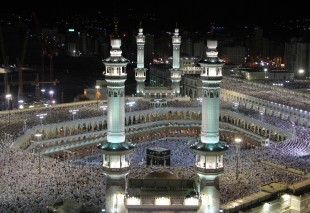

Industry backs suspension of KSA tourist visas

Leading hospitality industry figures have backed Saudi Arabia's implementation of the ‘Extended Umrah Tourism Programme’ to give visitors from 65 countries the chance to stay up to a month in the Kingdom following Umrah. This follows the suspension of its limited tourist visa progamme in March.
During a discussion that took place on stage at the Arabian Hotel Investment Conference (AHIC) on May 4 at Madinat, Dubai, president of the Saudi Commission for Tourism and Antiquities (SCTA), His Royal Highness Prince Sultan bin Salman commented: “SCTA has just begun the implementation of “After Umrah tourism” programme which allows Umrah seekers to join a month long tour programme in coordination with the Ministries of Haj, Interior and Foreign Affairs.”
This follows a speech in March at the Jeddah Economic Forum 2014 where HRH Prince Sultan revealed that the limited tourist visa programme “Discover! Saudi Arabia” had been suspended to allow the government to improve infrastructure before welcoming international visitors.
Raki Phillips, area director, sales & marketing, FRHI Hotels & Resorts, a group which has its entire KSA portfolio of three hotels centered in the holy city of Makkah, said that although the suspension of the limited tourist visa programme will impact demand, “the GCC customer drives a higher average rate and is a more frequent traveler than an international one, so hotels need to focus their efforts in attracting that customer”.
He added that the Extended Umrah Tourism Programme should “impact the hospitality industry very positively, in terms of occupancy and revenue” and that KSA should continue to focus on domestic rather than international tourism since this “drives increased spending, brand awareness, economic growth and job opportunities".
Chris Hewett, senior consultant at TRI Consulting, highlighted that last year: “Saudi Arabia issued approximately 1.1 million tourist from a total of 10.2 million, representing 11% of the total market”.
This means a suspension of the limited tourist visa is expected to have an impact on the demand in the Kingdom but this can be offset by increasing the number of religious tourist visas and with the Extended Umrah Tourism Programme.
Hewett commented: “[The Extended Umrah Tourism Programme] is a very encouraging move, as the religious market has been generally centred on the two holy cities of Makkah and Madinah. It will give an opportunity for the neighbouring markets including Jeddah, Yanbu and Jizan to capture this additional demand as religious visitors explore some of the cultural and historic attractions throughout the country.”
Hewett added that although there is an opportunity to increase international visitors, the country “still perceived as a closed market” and therefore in order to increase the appeal from this market, “this perception needs to change”.
Hilton vice president of operations for Saudi Arabia Mahmoud Mokhtar said: “KSA has made great progress in improving the infrastructure of the country, enhancing airline routes and carriers, and developing viable visitor strategies and campaigns. We are confident that the country’s commitment to developing a practical tourism sector will create a sustainable hospitality environment and have a positive impact on the expansion and evolution of KSA as a leisure and business destination, locally and internationally.”